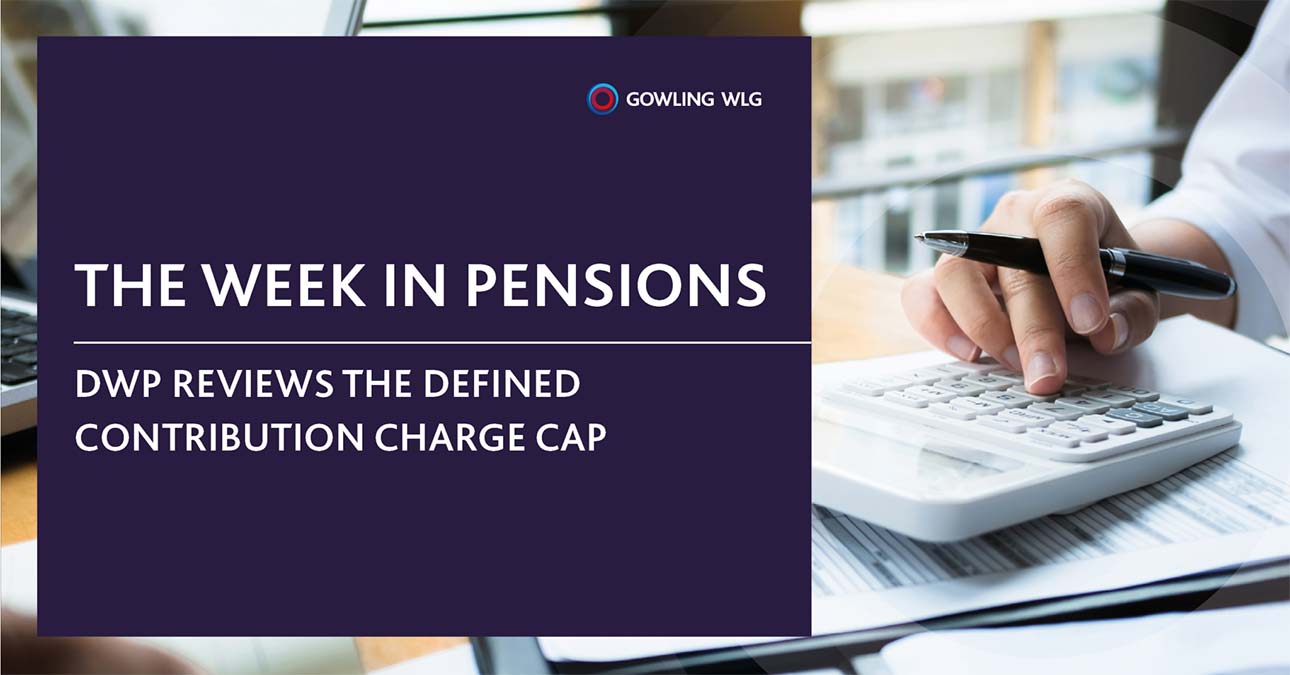Get up to speed with this week’s update on UK workplace pensions law and regulation (including the DWP review of the defined contribution charge cap) in this week’s edition of The Week In Pensions.
Watch the video update
This week’s pensions legal and regulatory developments
DWP opens review of the defined contribution default fund charge cap and standardised cost disclosure
On 25 June 2020 the Department for Work and Pensions (DWP) issued a call for evidence document Review of the Default Fund Charge Cap and Standardised Cost Disclosure (the Review). The call for evidence closes on 20 August 2020. The Review focuses on three key areas:
- whether the rate and scope of the charge cap is fit for purpose – whether transaction costs and costs associated with the provision of non-standard add-ons (such as life assurance) should fall under the cap;
- fee structures – whether flat fees should continue to be permitted at all or whether they can continue to operate with certain conditions attached to them (for example, a minimum pot size before they can be charged); and
- the use of standardised cost disclosure templates by asset managers when reporting their costs to trustees, and whether these are being used effectively.
The government is considering whether to legislate to require trustees to submit information about whether they have used the Cost Transparency Initiative reporting template as part of the registrable information submitted in the scheme return.
More information
PLSA publishes joint guidance on how to achieve effective stewardship for pension schemes
The Pensions and Lifetime Savings Association has, in conjunction with the Investor Forum, published a joint guidance document titled Engaging the Engagers: A practical toolkit for schemes to achieve effective stewardship through their managers.
As a reminder, the 2020 Stewardship Code defines stewardship as “the responsible allocation, management and oversight of capital to create longterm value for clients and beneficiaries leading to sustainable benefits for the economy, the environment and society.”
The PLSA’s Toolkit aims to provide a framework for trustees and asset managers approach stewardship and engagement and to:
- assess the critical components required to deliver effective stewardship; and
- evaluate the quality of the approach taken by their managers and the outcomes achieved.
In doing so, the Toolkit sets out how to apply and monitor strategies on stewardship across a range of asset classes and examines how to engage individually and collaboratively.
It also sets out questions to ask asset managers as part of ongoing monitoring and in appointment and reappointment processes.
More information
TPR updates Corporate Plan to address COVID challenges – focus on protecting savers remains clear
Protecting savers and driving up standards in workplace pensions remains at the heart of The Pensions Regulator’s (TPR) new Corporate Plan, which was published last week. The new Corporate Plan has been reshaped by COVID-19, but TPR is at pains to point out that it will not be blown off its course in terms of using its powers to tackle those who flout the law, embracing its new powers and continuing to forge stronger relationships with schemes. The six priorities set out in TPR’s Corporate Plan 2020-21 are for TPR to:
- support workplace pensions schemes to deliver benefits through significant change driven by the global pandemic.
- protect pension savers across all scheme types through proactive and targeted regulatory interventions.
- provide clarity to, and promote the high standards of trusteeship, governance and administration we expect.
- intervene where appropriate so that defined benefit schemes achieve their long-term funding strategy and deliver on pension promises.
- ensure jobholders have an opportunity to save into a qualifying workplace pension through automatic enrolment.
- continue to build a regulator capable of meeting the future challenges.
More information
News round-up
Other shorter items to note in This Week In Pensions include:
- The Pension SuperFund has announced it has completed registration as an occupational pension scheme by HM Revenue & Customs; and
- The Pension Schemes Bill 2019 – 21 is now scheduled for its third reading in the House of Lords. It will not be a bit of a race for this to be passed before Parliament rises for the summer recess on 22 July 2020.
Pensions in the press
- Pensions Expert reports that the former Chancellor of the Exchequer, Sajid Javid, has called for a flat-rate pension tax relief as part of a wide-ranging post-COVID recovery plan published by the Centre for Policy Studies. Mr Javid advocates the move as part of a proposed “system-wide review of the UK tax system, with a general shift away from taxing incomes and profits towards fairer, more progressive taxation of property and tightening reliefs, which favour the wealthy”. Click here for the full story.
- Employee Benefits reveals the average pension pot in the UK for employees in large firms is now £120,000, a 35% increase from 2017. The study of 200 employees, carried out by Chase Brothers and published June 2020, also found that average savings and investments has fallen by 3%. Click here for the full story.
- The Financial Times reports that one in 10 workers in the UK have stopped saving into their pensions or have cut their contributions in the wake of the coronavirus crisis. New research has shown that 11 per cent of workers have responded to pandemic pressures by pulling back on payments into their pension funds, with just as many saying they are revising their future retirement plans. Click here for the full story.
The Week In Pensions
The Week In Pensions provides you with a digest of the most important developments in UK workplace pensions law and regulation along with highlighting some of the most interesting stories from the pensions industry and national press.
You can see all editions of The Week In Pensions here.
Pensions at Gowling WLG
Find out more about the pensions team at Gowling WLG and get more detailed Insights and other great pensions content from the team on the Gowling WLG website.
About the author(s)
Ian is a London-based professional support lawyer (PSL) legal director. Ian is a member of our pensions and combined human resource solutions (CHRS) teams. He works with clients to solve their employment and pensions law issues. Ian maintains a particular focus on 'crossover' issues that benefit from his understanding of both areas of law.

